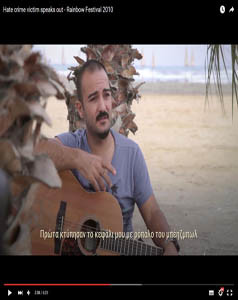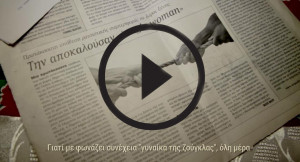TOGETHER!
Empowering civil society and Law Enforcement Agencies to make hate crimes visibleAbout the TOGETHER Project
VISIT THE WEBSITE OF THE PROJECT TO FIND OUT MORE. LIKE US ON FACEBOOK AND TWITTER
The context: a glance at the present
Despite the efforts of EU Member States to fight hate crimes based on racism and xenophobia, there are indications that the situation in Europe is not improving. In particular, according with the European Agency on Fundamental Rights (FRA), under-reporting of hate crimes continue to be a significant problem across Europe. Many times victims do not identify the crime they suffered as a hate crime, or don’t report it to Law Enforcement Agencies (LEAs) for fear and lack of trust in authorities. Alike, most of the time LEAs, non-governmental organizations or victim support groups don’t have the specific knowledge to identify and report correctly this type of crimes. As a result, many crimes remain invisible. In such cases, the rights of victims may not be fully respected or protected, meaning that EU Member States are not upholding their obligations towards victims.
Duration of the project
A 1st December 2014 – 31st November 2016
Involved countries
Cyprus, Czech Republic, Italy, Spain.
Goals, Activities and Outcomes
The goal: why this project?
This project aims to improve LEAs and civil society abilities in making hate crimes visible among European society, which is the first step to tackle hate crimes and address related fundamental rights violations. The specific objectives of the project are:
– to strengthen the capacity of LEAs, NGOs and community-based organizations to identify and report hate crimes and to interact with victims;
– to improve data collection on hate crimes by creating and implementing standard methodologies and tools for data collection aimed at LEAs and civil society organizations;
– to strengthen networking and collaboration between LEAs and civil society –on a national and international level– in information exchange and follow up on hate crimes.
The activities: what to do?
To reach the goals of raise awareness on hate crimes, improve civil society abilities in making hate crimes visible, and fight hate crimes based on racism and xenophobia, the project will act on different levels and settings:
1) training on hate crimes, particularly aimed at members of LEAs, NGOs and community-based organizations.
2) information and communication about hate crimes reporting, also using data collection tool and mechanisms of information exchange between civil society and LEAs
3) dissemination of knowledges and best pratices against hate crimes
The outcomes: materials and instruments
– training sessions
– handbook
– didactical package
– videos
– data collection tools
– reports
All these instruments will be available on this website, making possible that concerned people, organizations, institutions etc. use them to raise awareness on hate crimes among the European society.
Project Partners
Camera del lavoro di Milano
CGIL Milan is Union organization, funded in 1891, which historical aim was to engage for the application of the rights of workers and citizens. Since the beginning of the 20th century it has developed a widespread presence and range of services in the regional territories, that can be considered as unique in Europe. This presence has been improved in the 80s , with the development of help desks for the free legal guardianship in the territory ( legal aid desks, Inca patronages, SPI, fiscal services) and the promotion of different associative agents and services . Thanks to its widespread presence, Cgil has gained a particular attention and active presence in the territories , developing the awareness on the importance of placing side by side Cgil traditional work negotiation with the social and human rights negotiation, in order to connect the rights to work to the citizenship rights.
KISA
KISA is a NGO, established in 1998, and its vision is the promotion of an all-inclusive, multicultural society, free of racism, xenophobia and discrimination and where, through the interaction and mutual respect of diverse cultures, there will be equality and respect for the rights of all, irrespective of race, nationality or ethnicity, colour, creed or beliefs, gender, sexual preference or orientation, age, inability or any other diversity.
Lunaria
Lunaria is, according to the current Italian legislation, an Association for Social Promotion. It was created in 1992, and since then it is a non governmental body, autonomous from religious and political affiliations and not-profit. Lunaria promotes the “principles of justice, social and economical solidarity, democratic participation to the life of the community, promotion of the civil, social and human rights both at national and international level” (art. 3 of the Constitution Chart). In order to contribute to the achievements of such principles, the organisation developes research, training, communication and consultancy actions in the following fields:
• international economy, third sector and ethical finance;
• immigration, fight to racism and social exclusion;
• international voluntary service and youth exchanges.
OPU – Organization for Aid to Refugees
The Organization for Aid to Refugees (OPU) is a nongovernmental organization, which has a 24-year-long experience with providing social and legal aid to asylum seekers and beneficiaries of international protection in the Czech Republic. The main goal of the organization in the legal field is to provide high-quality legal counseling for asylum seekers and to help improve the situation of refugees seeking protection in the Czech Republic. OPU identifies gaps in the law and tries to ensure that laws and policies in the area of international protection do not violate human rights, while laws are interpreted and enforced properly.
SOS Racisme Catalunya
SOS Racisme Catalunya is a non profit, non-governmental organization (NGO) established in 1989 and based in Barcelona, that focus its actions in the fight against racism and xenophobia, defending the equality in rights and opportunities for all people who live together and share the same society (www.sosracisme.org).
SOS Racismo / SOS Arrazakeria Gipuzkoa
SOS Racismo /SOS Arrazakeria Gipuzkoa is a grass root, non-profit, antiracist, democratic, multiethnic, progressive and internationalist organization, in which everyone has the same rights and obligations. It belongs to the SOS Racism Federation in Spain and holds its Secretariat. It was formally founded in 1993 with the aim to fight all forms of discrimination and segregation based on skin color, ethnicity or cultural background. Whether this discrimination is on an individual, group or institutional level we demand tolerance, respect and understanding with equal rights for all.
Università di Roma 3 -Osservatorio contro il razzismo

About Hate Crime
Hate crimes are criminal acts motivated by bias or prejudice towards particular groups of people. To be considered a hate crime, the offence must meet two criteria:
– first, the act must constitute an offence under criminal law
– second, the act must have been motivated by bias
Bias motivations can be broadly defined as preconceived negative opinions, stereotypical assumptions, intolerance or hatred directed to a particular group that shares a common characteristic, such as “race”, ethnicity, language, religion, nationality, sexual orientation, gender or any other fundamental characteristic. People with disabilities may also be victims of hate crimes.
Hate crimes can include threats, property damage, assault, murder or any other criminal offence committed with a bias motivation. Hate crimes don’t only affect individuals from specific groups. People or property merely associated with – or even perceived to be a member of – a group that shares a protected characteristic, such as human rights defenders, community centres or places of worship, can also be targets of hate crimes.
Hate crimes affect the security of individuals, their communities and societies as a whole.Effective responses to hate crimes are necessary to prevent them from posing a serious security challenge. In extreme situations, they can lead to wars within and across national borders.
– Definition given by the Office for Democratic Institutions and Human Rights (ODIHR), the human rights institution of the Organization for Security and Co-operation in Europe (OSCE) –
Reports
EDUCATIONAL VIDEOS
 Hate crime survivor speaks out – Rainbow Festival 2010
Hate crime survivor speaks out – Rainbow Festival 2010
Sertunc Akdogu, a Turkish Cypriot musician who was stabbed by members of far-right groups during the Rainbow festival 2010 speaks out about what the incident and particularly for the failure of the police to protect the victims of the attack. Rainbow Festival was organized by KISA in 2010 at the same time and place as a right-wing demonstration against “irregular immigration”. 13 participants of the festival were hospitalized after an unprovoked attack by the Neo-Nazi demonstrators. None of the racists were arrested at that day while court acquitted three persons who were accused for incitement and participation in racist hatred and racial violence.
 “Racism should stop” – Hate crime victim discloses her experiences
“Racism should stop” – Hate crime victim discloses her experiences
A.G was repeatedly insulted and threatened by her neighbors because of her color. She filed a complaint to the police but no measures were taken to protect the victim, punish the perpetrators and to prevent similar racist attacks in the future. When she couldn’t stay silent any longer, A.G reacted to their insults but the situation became even more difficult and complicated for her family.
Mapping report on Hate Crime – Country: Cyprus (pdf)



